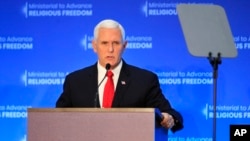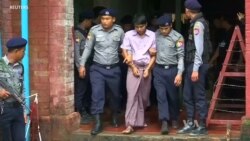U.S. Vice President Mike Pence on Tuesday called on Myanmar's government to reverse a court ruling that imprisoned two Reuters journalists for seven years and to release them immediately.
The journalists were found guilty Monday on official-secrets charges in a landmark case seen as a test of progress toward democracy in Myanmar, which was ruled by a military junta until 2011.
Wa Lone, 32, and Kyaw Soe Oo, 28, were investigating the killing by security forces of Rohingya villagers at the time of their arrest last December, and had pleaded not guilty.
"Wa Lone & Kyaw Soe Oo shd be commended 'not imprisoned' for their work exposing human rights violations & mass killings. Freedom of religion & freedom of the press are essential to a strong democracy," Pence wrote on Twitter.
Pence is the most senior U.S. official to add his voice to an international outcry against the verdict by a Myanmar judge, who said the two had breached the colonial-era Official Secrets Act when they collected and obtained confidential documents.
WATCH: Reporters' Lawyer: Harsh Sentence Will Tarnish Myanmar's Image
In Yangon earlier Tuesday, the wives of the two journalists insisted that the men were innocent and called for them to be reunited with their families.
"Deeply troubled by the Burmese court ruling sentencing 2 @Reuters journalists to 7 years in jail for doing their job reporting on the atrocities being committed on the Rohingya people," Pence wrote in another tweet.
U.S. Ambassador to the United Nations Nikki Haley said Tuesday that the United States would become more vocal about the two journalists' situation.
Speaking at a news conference in New York marking the U.S. assumption of the rotating chairmanship of the Security Council for September, Haley said the reporters were "in prison for telling the truth."
Mark Green, administrator for the U.S. Agency for International Development, said "these convictions are an enormous setback for democracy and the rule of law in Burma."
Mounting pressure
The verdict came amid mounting pressure on the government of Nobel laureate Aung San Suu Kyi over a security crackdown sparked by attacks by Rohingya Muslim insurgents on security forces in Rakhine state in west Myanmar in August 2017.
More than 700,000 stateless Rohingya Muslims have fled into Bangladesh since then, according to U.N. agencies. The Rohingya, who regard themselves as native to Rakhine, are widely considered as interlopers by the country's Buddhist majority and are denied citizenship.
Neither Suu Kyi nor her government have commented publicly on the case since the reporters were convicted.
The journalists were arrested December 12 while investigating the killing of 10 Rohingya men and boys and other abuses involving soldiers and police in the village of Inn Din.
Myanmar has denied allegations of atrocities against Rohingya by its security forces, saying it conducted a legitimate counterinsurgency operation against Muslim militants.
The military acknowledged the killing of the 10 Rohingya at Inn Din after arresting the Reuters reporters.
A U.N-mandated fact-finding mission said last week that Myanmar's military carried out mass killings and gang rapes of Muslim Rohingya with "genocidal intent" and called for top generals to be prosecuted. Myanmar rejected the findings.
The International Criminal Court is considering whether it has jurisdiction over events in Rakhine, while the United States, the European Union and Canada have sanctioned Myanmar military and police officers over the crackdown.








